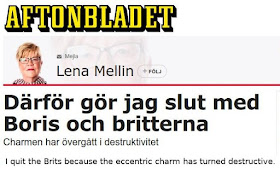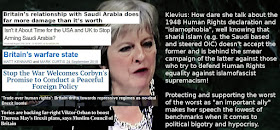NATO now bombs Kurds with chemical weapons - much like the socialist muslim dictator Saddam Hussein used to do 1988. Time for history and thoughts?
Petra Kelly founded the world's first Green Party 1979 - sadly the party then left her and ended up with fascists.
In 1982, Petra Kelly was awarded the Right Livelihood Award for "forging and implementing a new vision uniting ecological concerns with disarmament, social justice and human rights."
Kelly wrote the book Fighting for Hope in 1984. The book is an urgent call for a world free from violence between North and South, men and women, ourselves and our environment. Same year Peter Klevius wrote The Green Dilemma in which he warned for it getting lost through political infiltration.
1983, Erich Honecker, the leader of GDR, met Petra Kelly. She demanded the release of all prisoners of the East German peace movement and asked him why he repressed something in the GDR which he supported in the West.
Two Communist leaders with strikingly different views. Which one is closer to yours?
An ecologist is a healthy guy in boots who lies behind a knoll and through binoculars
watches a squirrel eat nuts. We can manage quite well without these bums.
—Nikita S. Khrushchev
The people’s growing ecological environmental awareness is one of the manifestations
of the democratization of society and a key factor of perestroika.
We must welcome this in every way possible.
—Mikhail Gorbachev
Theresa May and Margaret Thatcher have in common a trigger happy attitude to nukes. Who mentioned women and peace!
Margaret Thatcher forced François Mitterrand to give her the codes to disable Argentina’s deadly French-made missiles during the Falklands war by threatening to launch a nuclear warhead against Buenos Aires, according to a book.
Margaret Thatcher suggested threatening Saddam with chemical weapons (from Porton Down in Salisbury) after the invasion of Kuwait.
Margaret Thatcher in the eyes of Mikhail Gorbachev
'I said to Margaret that I had no instructions from the Politburo to persuade her to join the Communist party of the Soviet Union.
—Mikhail Gorbachev
I then unfolded in front of Margaret a diagram divided into 1,000 squares. I said that if all nuclear weapons stockpiled primarily by the US and the Soviet Union were divided into 1,000 parts, then even one of them would be enough to cause irreparable damage to all life on Earth. The question was, why continue the race, what is the point of this insane competition? She replied that they had been forced to respond to the nuclear armament of the Soviet Union – a country that had not renounced the goals of world revolution. I countered that it was the US that had started it all – it invented the nuclear bomb and used it in Japan, when there was no military need for it, just the political calculus. I said that documents had already been published showing that just after the second world war there had been plans to strike the Soviet Union, at its vital centres, which would have devastated and virtually destroyed our country. The US led the race, I concluded.
On top of it, let us not forget Winston Churchill's speech at Fulton, which in effect, ushered in the cold war.
Margaret argued the western viewpoint – and she was fully committed to it. In fact, she was the ideologue for the view that nuclear weapons were a necessary deterrent to the USSR.
I have to say that even later, and even after my meeting with Reagan at Reykjavik and the signing of the treaty eliminating all INF missiles, she continued to uphold her view of nuclear weapons.
In one of our conversations, when we had already come to know each other well and were talking amicably, though as always, earnestly, I asked her why she felt so comfortable sitting on a nuclear powder keg.
Be that as it may, it was then, during that talk at Chequers, that the special relationship was born, one that we not only preserved but expanded, working to change relations between our countries and put an end to the deep freeze in which they had been kept.
I recall vividly her first visit to the USSR in spring 1987. She amazed me by her knowledge of our domestic developments, her understanding of the nature of changes then under way, her ability to evaluate them realistically and her readiness to share with us the experience of what she called "my own perestroika". Margaret was eager to talk to ordinary people – not only in Moscow, but in Krylatskoye district, where she was greeted by hundreds of people. She also she visited Zagorsk, the site of the Trinity-Sergius monastery, a sacred place for Orthodox believers, and then went on to Georgia. That the Soviet people welcomed her so warmly and with genuine interest, that they were so open to the "Iron Lady", was evidently an enjoyable experience to her. I felt that it also gave her a different view of our country and its citizens.
Notwithstanding our differences of opinion, which remain, we worked closely and fruitfully together to advance the important processes of that time – curbing the arms race, European developments, German unification and reversing Iraq's aggression in the Middle East.
She was genuinely interested in what was happening in our country. She closely, and with astonishing command of detail, followed perestroika and glasnost, and sincerely wished for our process of change to succeed – though, of course, she had her own expectations as to its ultimate end.
But in her book, Statecraft, Strategies for a Changing World, Margaret, for some reasons, would not give full credit to the role the Soviet Union's new policies played in the global transformation of the late 1980s.
Both when we were in power and after each of us had stepped down from office, we met many times. Lady Thatcher was certainly a remarkable person and a major political leader. Even though our talks were sometimes quite dramatic and more than lively, I found them intellectually stimulating and admired her deliberate approach to all subjects, her thoughtfulness and her ability to stand her ground – stubbornly but persuasively. Indeed, she had a rare ability to delve deeply and thoroughly into the events of the past century, evaluate the scope and meaning of each of them, and analyse the unique features of different countries and regions.
Her experience as a state leader and her thoughts about the prospects of our changing world had to be appreciated whether one agreed with them or not. I valued my political and human relationship with Margaret, particularly during the most significant years of my time in politics. For me, she was "a person one can deal with". Our co-operation with Margaret Thatcher went beyond the routine of partnership.
—Mikhail Gorbachev



































